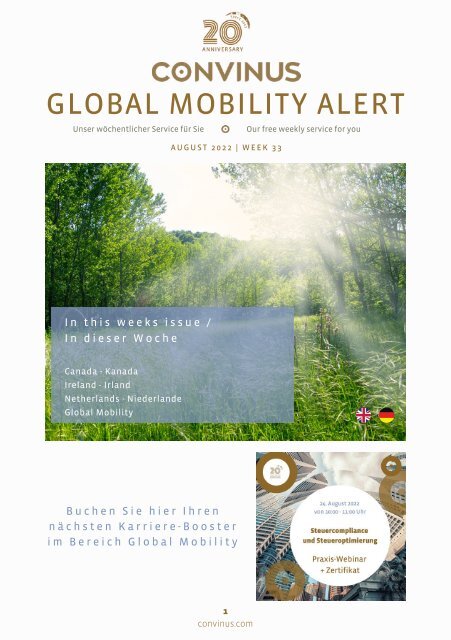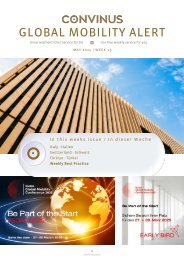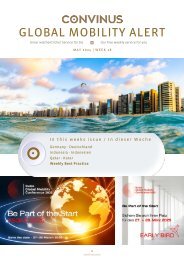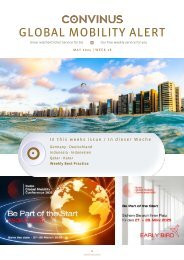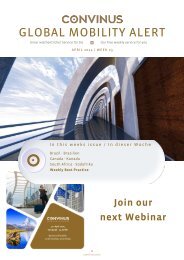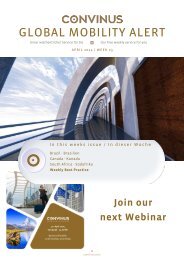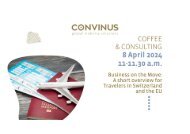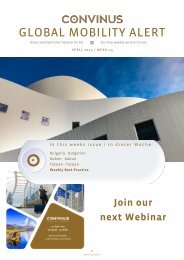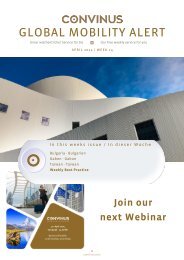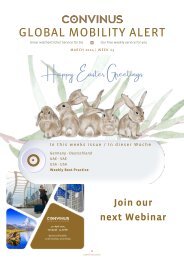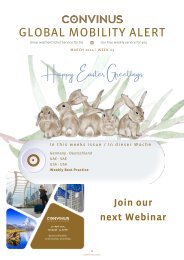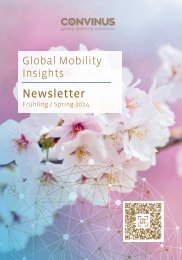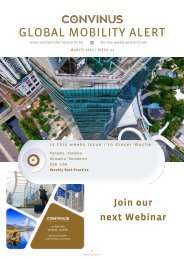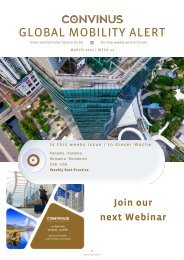CONVINUS Global Mobility Alert Week 33.2022
Create successful ePaper yourself
Turn your PDF publications into a flip-book with our unique Google optimized e-Paper software.
GLOBAL MOBILITY ALERT<br />
Unser wöchentlicher Service für Sie Our free weekly service for you<br />
A U G U S T 2 0 2 2 | W E E K 3 3<br />
I n t h i s w e e k s i s s u e /<br />
I n d i e s e r W o c h e<br />
Canada - Kanada<br />
Ireland - Irland<br />
Netherlands - Niederlande<br />
<strong>Global</strong> <strong>Mobility</strong><br />
B u c h e n S i e h i e r I h r e n<br />
n ä c h s t e n K a r r i e r e - B o o s t e r<br />
i m B e r e i c h G l o b a l M o b i l i t y<br />
1<br />
convinus.com
Canada / August 18 , 2022<br />
Delay in issuing Start-Up Visas (SUV) for<br />
entrepreneurs<br />
Since 2018, immigrant entrepreneurs who have an innovative business idea can qualify for the Start-Up Visa (SUV)<br />
program. To be eligible for the Start-up Visa Program, applicants must have a qualifying business, get a letter of<br />
support from a designated organization, meet the language requirements, and bring enough money to settle in<br />
Canada.<br />
Currently, there are 1000 quotas available, but these are shared with self-employed professionals. Due to the high<br />
demand, it is planned to increase the number of quotas to 1500 in 2024.<br />
At the time the SUV program was introduced, a processing time communicated was 16 months. However, due to the<br />
high demand and the lack of resources within the Canadian authorities, the current processing time is 32 months.<br />
Please refer to the following link regarding the SUV application and immigration process:<br />
https://www.canada.ca/en/immigration-refugees-citizenship/services/immigrate-canada/start-visa/about.html<br />
Kanada / 18. August 2022<br />
Verzögerung bei der Erteilung von Start-Up-Visen<br />
(SUV) für Unternehmer<br />
Seit 2018 können sich zugewanderte Unternehmer mit einer innovativen Geschäftsidee für das Start-Up-Visum-<br />
Programm (SUV) qualifizieren. Um sich für das SUV-Programm zu qualifizieren, müssen die Bewerber ein<br />
qualifiziertes Unternehmen haben, ein Unterstützungsschreiben von einer bestimmten Organisation erhalten, die<br />
sprachlichen Anforderungen erfüllen und genügend Geld mitbringen, um sich in Kanada niederzulassen.<br />
Derzeit stehen 1000 Kontingente zur Verfügung, die jedoch mit Selbstständigen geteilt werden. Aufgrund der<br />
hohen Nachfrage ist geplant, die Zahl der Kontingente im Jahr 2024 auf 1500 zu erhöhen.<br />
Zum Zeitpunkt der Einführung des SUV-Programms wurde eine Bearbeitungszeit von 16 Monaten kommuniziert.<br />
Aufgrund der hohen Nachfrage und des Mangels an Ressourcen bei den kanadischen Behörden beträgt die<br />
Bearbeitungszeit derzeit jedoch 32 Monate.<br />
Informationen über das SUV-Gesuchs- und Einwanderungsverfahren finden Sie unter folgendem Link:<br />
https://www.canada.ca/en/immigration-refugees-citizenship/services/immigrate-canada/start-visa/about.html<br />
2<br />
convinus.com
Haben Sie schon<br />
Ihre Vorsätze für<br />
das neue Jahr<br />
getroffen?<br />
2022<br />
investieren Sie<br />
in Ihre Karriere<br />
Ihr <strong>Global</strong> <strong>Mobility</strong><br />
Karriere-Booster!<br />
Mit unseren<br />
Webinaren inkl.<br />
Zertifikat über Ihre<br />
neu erworbenen Skills<br />
Alle Details:<br />
shop.convinus.com
Ireland / August 18, 2022<br />
Modernization of the work permit system<br />
Reforms to the work permit system are imminent in Ireland. The aim is to standardize work permit procedures for<br />
third-country nationals and make them more effective. The introduction of a new seasonal work permit is planned,<br />
as well as compliance with salary thresholds as a requirement for the issuance of a work permit. The qualification<br />
requirements will also become a bit stricter by requiring certain education or training.<br />
Furthermore, the labor market test procedure will be revised to synchronize labor needs in the business sector,<br />
giving priority to the Irish and EEA labor pools.<br />
Also in the health sector, Ireland had earlier this year allowed easier access to the labor market for all doctors who<br />
had worked in Ireland for 2 to 3 years. The changes aim to improve the flexibility of the system without changing<br />
the core objective.<br />
Irland / 18. August 2022<br />
Modernisierung des Arbeitsbewilligungssystems<br />
In Irland stehen Reformen im Bereich des Arbeitsbewilligungssystem bevor. Dadurch sollen<br />
Arbeitsbewilligungsverfahren für Drittstaatsangehörige standardisiert und effektiver werden. Vorgesehen ist die<br />
Einführung einer neuen saisonaler Arbeitsbewilligung sowie die Einhaltung der Gehaltsschwellen als Anforderung<br />
für die Erteilung einer Arbeitsbewilligung. Die Qualifikationsanforderungen werden auch ein wenig strenger,<br />
dadurch dass bestimmte Aus- oder Weiterbildungen vorausgesetzt werden.<br />
Des Weiteren wird das Verfahren des Arbeitsmarkttests überarbeitet werden, um den Arbeitskräftebedarf im<br />
Wirtschaftssektor zu synchronisieren und dabei dem irischen und EWR-Arbeitskräftepool Vorrang zu geben.<br />
Auch im Gesundheitswesen hatte Irland Anfang des Jahres allen Ärzten, die 2 bis 3 Jahre in Irland gearbeitet hatten,<br />
erleichterten Zugang auf den Arbeitsmarkt erlaubt. Die Änderungen zielen darauf ab, die Flexibilität des Systems<br />
zu verbessern, ohne das Kernziel zu verändern.<br />
4<br />
convinus.com
Netherlands / August 18, 2022<br />
Taxation of remuneration of directors as of 1<br />
January 2023<br />
The Dutch tax authorities had originally intended that the remuneration of directors of a foreign company for tax<br />
residents in the Netherlands would only be considered for determining the tax rate with effect from 1 January 2023.<br />
This would have had the consequence that the remuneration would have been exempted from Dutch taxation.<br />
However, most double taxation treaties in the Netherlands do not provide for tax exemption but for the tax credit<br />
for the avoidance of double taxation in these cases.<br />
Now the Dutch tax authorities have revoked this provision, among other things because it would lead to unequal<br />
treatment of directors of Dutch companies. Accordingly, it is envisaged that the rules of the double taxation treaty<br />
will be applied in the context of avoiding double taxation.<br />
When applying the tax credit method, this now means that the taxation of the remuneration will be at least at the<br />
Dutch tax level. The maximum tax rate for employment income in the Netherlands is 49.5% starting with a taxable<br />
income of EUR 69,399 (2022).<br />
This tends to lead to considerable additional tax burdens for the persons concerned, which are usually<br />
compensated by the employers if the persons are on secondment in the Netherlands. These circumstances should<br />
be examined more closely.<br />
Niederlande / 18. August 2022<br />
Besteuerung der Vergütung von leitenden<br />
Angestellten per 1. Januar 2023<br />
ZDie niederländische Finanzverwaltung hatte eigentlich vorgehabt, dass die Vergütung von einem von leitenden<br />
Angestellten eines ausländischen Unternehmens mit Wohnsitz in den Niederlanden ab dem 1. Januar 2023 nur noch<br />
unter Progressionsvorbehalt zu berücksichtigen ist. Dies hätte zur Folge gehabt, dass die Vergütung von der<br />
niederländischen Besteuerung befreit wäre.<br />
Die meisten Doppelbesteuerungsabkommen der Niederlande sehen jedoch nicht die Steuerbefreiung, sondern die<br />
Steueranrechnung für die Vermeidung der Doppelbesteuerung in diesen Fällen vor.<br />
Jetzt hat die niederländische Finanzverwaltung dieses Vorhaben widerrufen, u.a. da dies zu einer<br />
Ungleichbehandlung von leitenden Angestellten von niederländischen Unternehmen würden. Demzufolge ist<br />
vorgesehen, dass im Rahmen der Vermeidung einer Doppelbesteuerung die Regelungen des<br />
Doppelbesteuerungsabkommens zur Anwendung kommen.<br />
Bei der Anwendung der Steueranrechnung bedeutet dies nun, dass die Besteuerung der Vergütung mind. auf<br />
niederländischem Steuerniveau liegen wird. Der Maximalsteuersatz für Erwerbseinkommen liegt in den<br />
Niederlanden bei 49.5% ab einem zu versteuernden Einkommen von EUR 69'399 (2022).<br />
Dies führt bei den betroffenen Personen tendenziell zu erheblichen Steuermehrbelastungen, welche in der Regel<br />
von den Arbeitgebern ausgeglichen werden, sofern die Personen sich auf Entsendung in den Niederlanden<br />
befinden. Diese Sachverhalte sollte man genauer überprüfen.<br />
5<br />
convinus.com
August 18, 2022<br />
<strong>Global</strong> <strong>Mobility</strong>:<br />
Should an employer get involved in the tax<br />
details of the expatriate?<br />
When determining a compensation package for expatriates, taxation and the possible higher or lower tax costs always play a<br />
major role. As a rule, in most assignments, the employer will bear the additional tax costs. But what are the additional tax costs?<br />
The discussion starts with the way the hypothetical tax is calculated for the employee's tax withholding. After all, this is the tax<br />
portion that the employee must pay himself. In Switzerland there are several methods to choose from for this calculation; in<br />
other countries, the calculation methods are more limited. However, the question always arises as to whether only the<br />
remuneration of the expatriate is taken into account for this calculation or also the remuneration of the spouse or even any<br />
other income/assets. Likewise, there is no uniform procedure regarding the consideration of employee stock options/shares.<br />
The same questions also arise when determining the tax costs in the country of assignment, should only the expatriate's<br />
compensation be considered or the family income? If the expatriate also has a tax burden in the home country, is this also<br />
considered? Here, too, there are various options.<br />
As a rule, we recommend staying out of the employee's private tax affairs as much as possible and only taking the expatriate's<br />
remuneration into account when calculating the tax equalization both in the home country and in the country of assignment.<br />
However, we also advise that the expatriate be provided with a tax advisor in the country of assignment who takes over the tax<br />
declaration formalities. This ensures, on the one hand, that the formalities are properly completed and, on the other hand, that<br />
the tax costs in the country of the assignment are optimized, if possible.<br />
6<br />
convinus.com
18. August 2022<br />
<strong>Global</strong> <strong>Mobility</strong>:<br />
Sollte sich ein Arbeitgeber in die Steuerdetails des<br />
Entsandten einmischen?<br />
Bei der Bestimmung eines Vergütungspaketes bei den Entsandten spielt die Besteuerung und die möglichen höheren oder<br />
niedrigeren Steuerkosten immer eine grosse Rolle. In der Regel wird bei den allermeisten Entsendungen der Arbeitgeber, die<br />
Steuermehrkosten übernehmen. Nur was sind die Steuermehrkosten?<br />
Die Diskussionen fangen hier bei der Art und Weise wie die hypothetische Steuer für den Steuereinbehalt des Mitarbeiters<br />
berechnet wird. Denn dies ist der Steueranteil, den der Mitarbeiter selbst tragen muss. In der Schweiz stehen für diese<br />
Berechnung mehrere Methoden zur Auswahl; in anderen Ländern sind die Berechnungsmethoden limitierter. Die Frage jedoch, ob<br />
für diese Berechnung nur die Vergütung des Entsandten oder auch die Vergütung des Ehepartners oder sogar das andere<br />
Einkommen / Vermögen berücksichtigt wird, kommt immer auf. Ebenfalls gibt es keine einheitliche Vorgehensweise in Bezug auf<br />
die Berücksichtigung von Mitarbeiterbeteiligungen.<br />
Die gleichen Fragen stellen sich ebenfalls bei der Bestimmung der Steuerkosten im Einsatzland, sollen nur das<br />
Erwerbseinkommen des Mitarbeiters berücksichtigt werden oder das Familieneinkommen? Für den Fall, dass der Mitarbeiter<br />
auch noch eine Steuerbelastung im Heimatland hat, wird diese ebenfalls mitberücksichtigt? Auch hier gibt es verschiedene<br />
Möglichkeiten.<br />
Wir empfehlen in der Regel sich so gut wie möglich aus den privaten Steuerangelegenheiten des Mitarbeiters herauszuhalten<br />
und lediglich bei der Berechnung des Steuerausgleichs sowohl im Heimatland als auch im Einsatzland die Vergütung des<br />
Mitarbeiters zu berücksichtigen. Allerdings raten wir ebenfalls, dass man dem Mitarbeiter einen Steuerberater im Einsatzland<br />
zur Verfügung stellt, der die Steuererklärungsformalitäten übernimmt. Damit kann zum einen sichergestellt werden, dass die<br />
Formalitäten ordnungsgemäss erfüllt werden und zum anderen die Steuerkosten im Einsatzland auch, wenn möglich optimiert<br />
sind.<br />
7<br />
convinus.com


